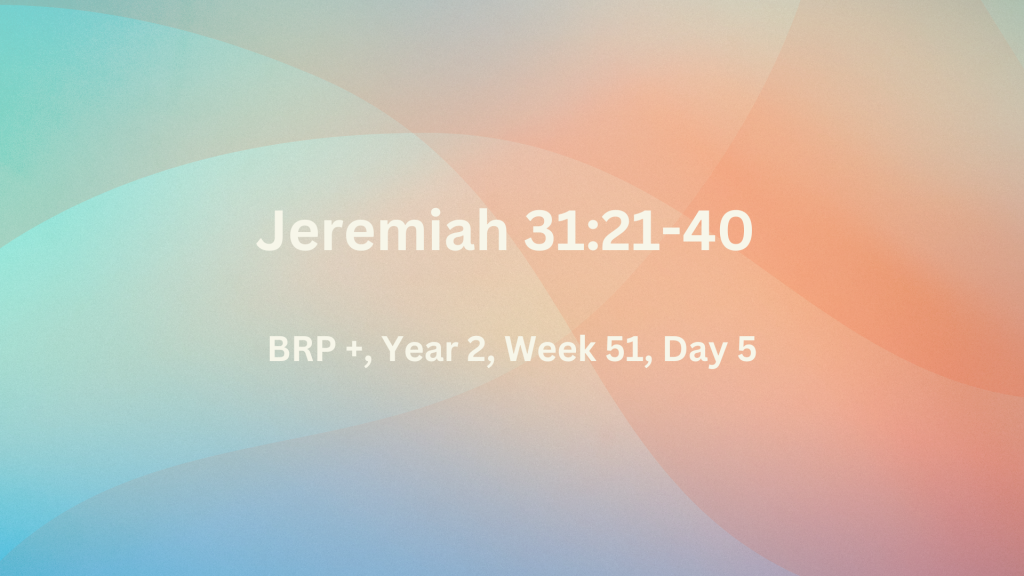Jeremiah 31:21-40
Q.1. How did God encourage faithless Israel and His grieving prophet? How did He apply Jeremiah’s call? What was God’s answer to Israel’s complaint against Him? – (Jer.31:21-30)
God’s judgment had caught up with the nation. Many had been taken to Babylon. Those remaining in the land would be destroyed. However, it was not all doom and gloom for the prophet, or for Judah. There would not just be deliverance from captivity, but also restoration for the children of Jacob (Jer.31:21-22 c.f. Jer.30:1-11; 18-24). God would do a new thing and restore the cities and Israel’s farming land (Jer.31:23-25). This vision of the future encouraged the weeping prophet. He wrote – At this I awoke and looked, and my sleep was pleasant to me (Jer.31:26). The Lord took His prophet back to his original call and revealed how it would be completed (Jer.31:27-28 c.f. Jer.1:9-10). Israel had complained that they were being punished for the sins of the past generation. That would change under Christ’s righteous reign – 29 “In those days they will not say again, ‘the fathers have eaten sour grapes, and the children’s teeth are set on edge.’ 30 But everyone will die for his own iniquity; each man who eats the sour grapes, his teeth will be set on edge (Jer.31:29-30).
Q.2. What made the New Covenant unbreakable? To whom would it apply? How was such a transformation possible? – (Jer.31:31-34)
Israel was incapable of keeping the Mosaic Covenant (just as we are) in spite of her promise (c.f. Exo.19:7-8; 24:1-3). However, God never breaks His covenant promises because He cannot do so. He disclosed a new unbreakable Covenant of the heart – 31 “Behold, days are coming,” declares the Lord, “when I will make a new covenant with the house of Israel and with the house of Judah, 32 not like the covenant which I made with their fathers in the day I took them by the hand to bring them out of the land of Egypt, My covenant which they broke, although I was a husband to them,” declares the Lord. 33 “But this is the covenant which I will make with the house of Israel after those days,” declares the Lord, “I will put My law within them and on their heart, I will write it; and I will be their God, and they shall be My people (Jer.31:31-33). Unlike the previous covenant that Israel broke, God explained this one’s superiority – 34 They will not teach again, each man his neighbour and each man his brother, saying, ‘Know the Lord,’ for they will all know Me, from the least of them to the greatest of them,” declares the Lord, “for I will forgive their iniquity, and their sin I will remember no more” (Jer.31:34 c.f. Heb.8:7-12). This promise was made specifically to the nation of Israel, although it also applies to all who place their trust in the Saviour. It is ‘new’, in that it depends on a work of God’s undeserved grace.
Q.3. How did God guarantee the New Covenant? How certain is the future of the nation of Israel? When will this happen? – (Jer.31:35-40)
When God confirmed His Covenant with Abraham, He guaranteed His promise with an oath (c.f. Gen.22:16-17; Heb.6:13-18). Similarly, God guaranteed the dependability of this new Covenant, with a staggering promise – 35 Thus says the Lord, Who gives the sun for light by day and the fixed order of the moon and the stars for light by night, Who stirs up the sea so that its waves roar; The Lord of hosts is His name: 36 “If this fixed order departs from before Me,” declares the Lord, “Then the offspring of Israel also will cease from being a nation before Me forever.” 37 Thus says the Lord, “If the heavens above can be measured and the foundations of the earth searched out below. Then I will also cast off all the offspring of Israel for all that they have done,” declares the Lord (Jer.31:35-37). The future of Israel is as certain as the heavens and the earth. Even the inheritance of the tribes of Israel was written in stone (Jer.31:38-40 c.f. Ezk.47:13-48:35). God prefaced these promises with the words – Behold, days are coming (Jer.31:27, 31, 38). This was intended for beyond Jeremiah’s time, because it has not happened yet. We await its fulfilment in the near future.

